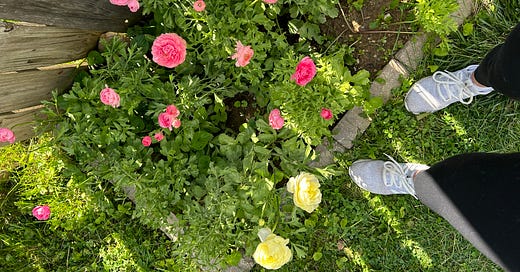Don’t tell my physical therapist or my husband but against their advice, I ran today. I knew it wasn’t wise considering my psoriatic arthritis diagnosis and my exercise intolerance (thanks to POTS).
My aching hips and ankles screamed at me almost immediately. I shushed them and kept going. I’m so tired of you holding me back, I told my body, as if it were something separate from me, something other, something that is of no use and only hinders me.
I made it only a quarter of a mile before my heart joined in the crying out with its 184 heart rate.
“Fine.” I slowed to a walk, catching my breath, feeling sick with over exertion.
I’m reminded today that our care for our bodies tells a lot about what we believe about them. This morning, instead of taking it slow like my body needed, I revealed my frustration with it. I just want my body to keep up with my mind. And because it so often doesn’t, I’m tempted to despise it. I want to run, but my body says no. I want to mow the grass, but my body revolts with a heart rate of 185, and dizziness steals my vision and my strength. Yet, this is the body God provided for me. The very one he knitted together in my mom’s abdomen. The one he calls good.
I’ve forgotten that my body is part of me—a gift given by a good God. That means my longing to toss it aside, to be free of my body itself and not just the sin that plagues it, is an inordinate desire. We were always meant to have bodies. Even our glorified bodies will be this one we live in now, only perfect, immortal (1 Corinthians 15:53).
We tend to fall into believing that our bodies, because they are marred by sin, are completely rotten like the fruit Eve ate. But the whole person includes both soul and body. Michael Horton says,
The soul is not divine, nor is the body demonic or evil; full humanity is a psychosomatic (body-soul) unity. We do not have a body (as if the soul were our real selves); we are created as psychosomatic (soul-body) whole, as persons. Our bodies (including our brain) and souls are not separate compartments, but interactive of our personal existence and activity.1
My body is warring with the sinful flesh that still resides in it. It’s battling, every day, the affects of the fall in the form of it’s breaking down. Yet my body (and yours) is still wonderfully made by a wonderful God (Psalm 139:14).
I’m learning to give thanks for my body—to be content with it, even if I wish it looked, felt, or operated differently. Even if it’s efficiency seems to be lacking. Because God gave me this body to steward. Not hers or yours or anyone else’s. And this body, despite its flaws, is a gift.
Michael Horton, Pilgrim Theology: Core Doctrines for Christian Disciples (Grand Rapids, MI: Zondervan Academic, 2013), 120.
ICYMI
Recent Essays, Articles, and Poems:
My Firstborn is Not My First Baby on Substack
May Recs: It’s Been a Minute + a Book Update on Substack
Healing Through Art on Substack
Discover the Joy of Imperfect Creativity on Well-Watered Women
Steadfast Devotional through Well-Watered Women





Brittany,
Perhaps you've read or heard of the carnivore diet already. People with serious, even severe body problems who have converted to this way of eating (or even just to keto) have found significant, even tremendous turn-around benefits. You might like to look into it!
Grace and joy, nj
As someone with a physical disability, I appreciate the reminder that my body is a gift.